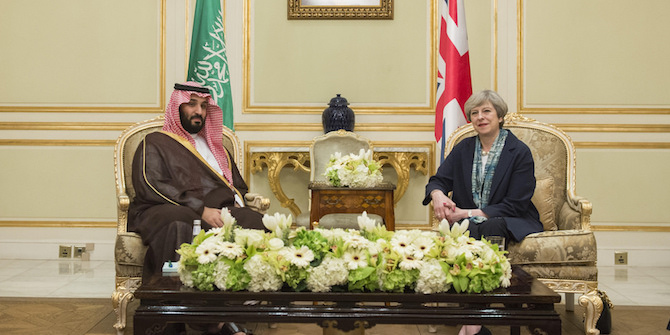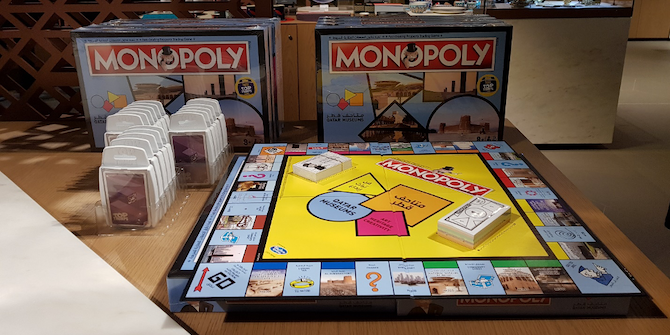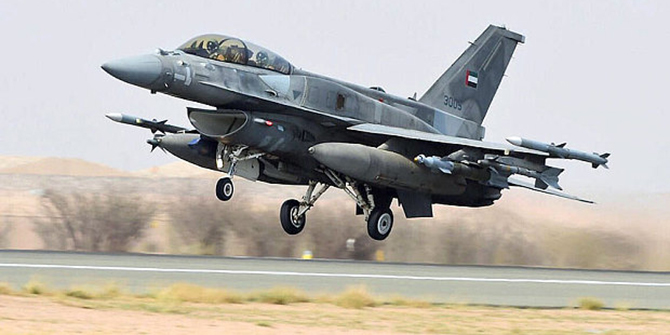by Madawi Al-Rasheed
This article is part of a 4-part series assessing the prospects for new directions in Saudi foreign policy under King Salman and his son.

Having secured the support, even if fleeting, of Donald Trump, does Muhammad ibn Salman have the time or inclination to seek further partnerships with European countries beyond the historical alliances that have more recently become rooted in trade, arm sales and security concerns?
Since World War II, Saudi relations with leading European countries – specifically Britain, France and Germany – were secondary to the project of greater military and security integration with the US. Many European countries, especially France and Britain, saw a window of opportunity to seek greater cooperation with the Saudis after 9/11 when they assumed the US would be unwilling to continue its unconditional support for the Kingdom after it became known that fifteen of the hijackers who attacked New York were Saudis. This proved to be a good moment to endear themselves to the Saudis by selling them arms denied to them by the US Congress, and by positioning Europe as the old ally who genuinely understood Saudi Arabia, its history and leadership more than the American neophytes. Saudi Arabia, on the other hand, sought to diversify its arms sources and leapt at the opportunity to buy more weapons from Europe.
Under the Conservative government of David Cameron, Britain’s arms sales to Saudi Arabia reached almost £6 billion. Britain needed to boost its trade with the Gulf in general and Saudi Arabia in particular immediately after the financial crisis of 2008. Under pressure from Saudi Arabia and the UAE, the British Prime Minister ordered an investigation into the Muslim Brotherhood in Britain with a view to banning the Islamist movement and limiting its global outreach. Saudi Arabia, keen to reverse the Brotherhood’s success in Egypt after the uprising of 2011, banned the movement in Saudi Arabia itself. The investigation, led by ex-ambassador to Saudi Arabia John Jenkins, found no clear links to terrorism. The Muslim Brotherhood continues to organise in Britain. It took the British government several months to release the information gathered during the consultation period, and Saudi Arabia was not pleased with the findings of the report.
The drive to seek closer ties with Saudi Arabia became more urgent after the British referendum of 2016 when it became certain that the British economy would face the possibility of shrinking after its exit from the European Union. Prime Minister Theresa May honoured her pledge to continue to be a friend of the Saudis and refrained from taking any measures or making statements that would embarrass them in the international arena. Like other European leaders, she rushed to visit the Saudis as part of a Gulf tour. In April 2017 she arrived in Riyadh (before Trump) and sought to strengthen trade relations with Saudi Arabia.
More recently, Theresa May has continued to block the publication of an internal Home Office report investigating Saudi sponsorship of radical religious ideology in Britain. The enquiry was commissioned by the Conservative–Liberal Democrat coalition government. It is believed that Theresa May is still resisting any exposure of Saudi Arabia to more criticism both in Britain and Europe. The release of the report may undermine relations with Riyadh at a critical moment for Britain when it is seeking new trade partners to compensate for its expected losses after Brexit.
Since 2015 when Saudi Arabia began airstrikes on Yemen, Britain came under mounting pressure from parliamentary committees and civil society organisations that oppose arm sales to countries that do not respect human rights and violate international law through illegal military interventions abroad. This became urgent after Muhammad ibn Salman launched his attack, allegedly using British cluster bombs and other banned weapons. Civilian deaths in Yemen, estimated at over 10,000, and the humanitarian crisis pushed British public opinion against arms sale but the logic of the British government remains constant: ‘if we don’t sell arms to the Saudis, the French will’.
Like Britain, following 9/11, France and Saudi became inter-connected through a series of arm deals that boosted the French economy and offered Saudi Arabia a sense of security, especially after France continued to be a staunch critic of Iran’s policy in the region, particularly in Lebanon, Syria and Iraq. Saudi military aid to Lebanon was conditional on purchasing equipment from France, a deal negotiated by then-President Francois Hollande. Saudi Arabia, however, cancelled this gift to Lebanon to put pressure on Iranian-backed Hezbollah, but pledged to compensate France for its losses.
Saudi Arabia looked to France for support in its bid to oust Syrian President Bashar al-Assad and strengthen the Syrian opposition to his regime. It also expected France not to normalise relations with Iran after the Nuclear Deal and to remain critical of its regional policy. France honoured the bargain in order to maintain its lucrative military trade with Saudi Arabia and neighbouring Gulf countries. However, more recently, the policy to oust Bashar al-Assad failed to materialise and both Saudi Arabia and France – in fact most European interested parties – are currently facing serious defeat in Syria. As the objective was not to mediate in the Syrian crisis and reach peaceful coexistence between the regime and the many opposition groups, some of which are violent radical Islamists and jihadists, a resolution in Syria was delayed until it became impossible to achieve. In a country where foreign policy has been the sole prerogative of the president since the times of General de Gaulle, France may continue to seek closer ties with Saudi Arabia after the French elections of 2017. But the Syrian debacle and the failure to resolve the crisis continue to haunt both countries.
Added to that is the new Saudi–Qatari crisis which started in May 2017. Muhammad ibn Salman expects France and other European countries to accept the Saudi narrative about Qatar’s sponsorship of terrorism, including its support for Hamas and the Muslim Brotherhood, who are both believed to destabilise the region, and the media policies of the pan-Arab al-Jazeera channel. Newly elected French President Emmanuel Macron may be put under pressure to endorse the Saudis against Qatar, a move that would undermine France’s greater economic and military interests in this small but rich Gulf state.
With wide-ranging economic and military ties with Saudi Arabia, Germany was less than enthusiastic about the sudden rise of the young Muhammad ibn Salman to power. In 2015, a leaked German intelligence report was damning about the prince. The report considered his rise cause for concern because of his ‘regional destabilising impact’. While it is very unusual for the German intelligence services to disseminate such reports, the leak was perhaps a deliberate warning signal intended for the international community in general, and Germany’s European partners in particular. Both King Salman and his son did not attend the annual G20 Summit in Hamburg in July 2017, though this may have been due to their preoccupation with the escalating Qatar crisis. Perhaps Saudi Arabia did not want to face additional pressure from the G20 members to resolve the crisis and seek negotiation, rather than the path – which they chose – of confrontation with the small emirate. The King and his son avoided further questioning by sending a technocrat to the G20 meeting. Another reason may be related to the abrupt sacking of Muhammad ibn Nayef and his alleged house arrest, both of which would signal a difficult and uncertain moment for the King, given that he must have alienated a large number of aspiring princes, many of whom are older and more experienced than his young son.
Saudi Arabia, however, cherishes economic relations with Germany in addition to the training opportunities it offers Saudi youth. In 2016, Saudi Arabia invited Germany to be a guest of honour at the annual National Guard al-Janadiriyah festival. However, even with over half a billion euros worth of weapons exported to Saudi Arabia, Germany was dismissed as a future military trading partner following their criticism of the Saudi-led war in Yemen. Chancellor Angela Merkel expressed alarm at the high level of civilian casualties and insisted that no military solution could resolve the conflict in Yemen. Saudi Arabia immediately responded by rejecting any future arms deals, which had long been lucrative but controversial in Germany.
Notwithstanding the existing close ties between Saudi Arabia and the aforementioned European countries, the new Saudi crown prince does not seem to have time for Europe at the moment. For him it remains a source of any weapons that he cannot get from the US and a network of support for his regional policies, especially his rivalry with Iran and his interventionist agenda. This results in European arms manufacturers and governments competing for the attention of the young prince, even if it comes to undermining their own national interest by continuing to uncritically support Saudi Arabia. A more fruitful European policy would push Saudi Arabia towards greater dialogue with Iran and a modus vivendi with this formidable regional power, rather than simply and unequivocally taking the Saudi side lest lucrative arm deals get diverted elsewhere.
Furthermore, the national interests of Saudi Arabia’s European allies would better be served by encouraging the Saudis to seek mediation and conflict resolution in their regional battles, from Damascus to Sanaʿa. As with Iranian interventions in Syria, Iraq, Lebanon and Yemen, Saudi meddling in internal affairs of Arab countries has had devastating effects, prolonging conflicts, militarising the Arab uprisings, and precipitating sectarian conflicts, humanitarian disasters and an unprecedented influx of refugees to European countries. Saudi Arabia’s role in spreading radical religious ideology is still a taboo topic in many European capitals where governments remain silent, preferring not to confront Riyadh with clear evidence of its involvement in radicalising a troubled European Muslim population.
Europe may have lost its favourite Saudi candidate, deposed Crown Prince Muhammad ibn Nayef, who had established a good rapport with Western intelligence services as he was seen as a key player in the fight against terrorism. Counter-terrorism dominates European policy agendas from London and Paris to Bonn and beyond.
 Madawi Al-Rasheed is Visiting Professor at the LSE Middle East Centre. In January 2017, she returned to the MEC from a sabbatical year at the Middle East Institute, the National University of Singapore. Previously, she was Research Fellow at the Open Society Foundation. She tweets at @MadawiDr.
Madawi Al-Rasheed is Visiting Professor at the LSE Middle East Centre. In January 2017, she returned to the MEC from a sabbatical year at the Middle East Institute, the National University of Singapore. Previously, she was Research Fellow at the Open Society Foundation. She tweets at @MadawiDr.






